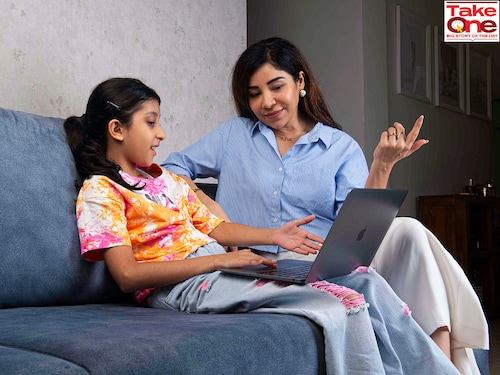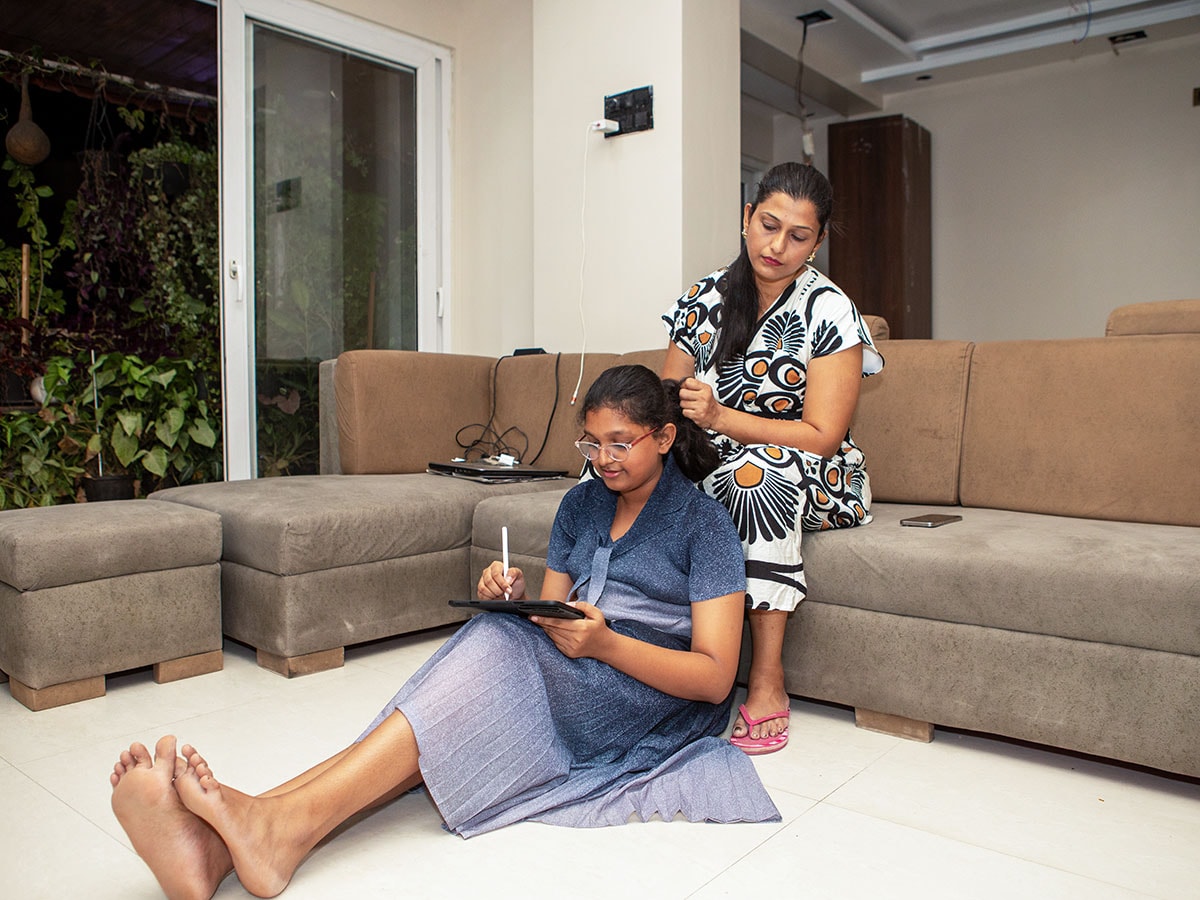AI and children: Friends or frenemies?
Children are increasingly using AI apps to do much more than just homework. Parents and experts weigh in on where to draw the line


When 10-year-old Inaaya Abrol and her friend decided to become the youngest entrepreneurs in the country, they turned to the world’s current favourite know-it-all—ChatGPT—for guidance. While they did get a lowdown on how to firm up their idea and come up with a business plan, like many 10-year-olds, they soon forgot all about it and moved on to other interests.
Children like Abrol, and those younger and older than her, are using artificial intelligence (AI) applications such as ChatGPT, Gemini and Perplexity for a myriad reasons other than firming up business plans. Some use it to finish their school homework, others to write speeches, complete projects, write essays, generate images, write code and play games, and still others turn to it for therapy and guidance. They are growing up with the familiarity of AI voice assistants like Alexa or Siri to play a song, know about the weather or get any information they might think of.
According to a January 2025 Pew Research Center report about teens in the US, their usage of ChatGPT for schoolwork doubled from 13 percent in 2023 to 26 percent in 2024. While it is difficult to find published data on AI usage among Indian children and teens, it is pretty commonplace to come across instances in our own circles of friends and families. The pace at which children are taking to AI has raised concerns among parents, educators, and even those creating AI apps.
Child psychologist Riddhi Doshi Patel, based in Mumbai, says excessive reliance on AI can hinder a child's creative thinking skills, cognitive skills, self-reliance, and confidence. She has been dealing with children and worried parents who think their kids are losing interest in the outside world and are looking at their gadgets all day, and prescribes restricted use of AI for children. She quotes an article she read: “When AI completes a task too quickly, it’s not helping a child to win. It’s quietly taking away the opportunity to learn how to think.”
Children between 5 and 13 years of age go through a lot of developmental processes such as concentration building, problem solving and creative thinking. Patel believes continuous use of AI can lead to a child losing the chance to be resilient. “AI is helpful sometimes, but its use should just be limited for certain age groups,” she adds.
Ahmedabad-based Shachi Joshi, a doctor and mother of a six-year-old, presents a different perspective, and perceives children’s use of AI as “a double-edged sword”. She thinks it has to be monitored because it could definitely be misused; it could do their schoolwork for them, and they might not know about work at all. But, if used in the right way, and in moderation, it is a great technology. “It's going to make life easier. If your life is being made easier, would you want it to be harder?” she asks. Joshi believes that if children's routines are regulated in the right way, she is not against getting them to understand AI products and using them in a smart way.
Joshi, whose son is using AI at school to learn coding and at home to come up with quizzes, thinks “directed AI” is the way to go for kids. Which means, at school, teachers should pre-feed information and prompts on AI apps, and children should be able to access only related information. A ChatGPT user herself, Joshi believes children are bound to be curious about how their parents use AI and would want to follow suit. “I want him to be well educated about it because I know he's going to try it,” she says. “I also give him the example of my profession, in which we get a lot of patients who ask questions to ChatGPT, and how we tell them to ensure they correlate it to what their doctors are advising.”
***
In July, Elon Musk, owner of social media platform X, announced the launch of ‘Baby Grok’, a child-friendly version of X’s AI Grok. This came after Google announced its intent to work on a Gemini app for children, which could be monitored and disabled by parents.
The launch of Baby Grok followed the controversial AI avatar called Ani, which Grok introduced. Numerous social media users had expressed serious concerns over the potential of Ani—a provocatively dressed blonde anime female character—promoting inappropriate or harmful behaviour among children by offering suggestive and sexualised content. Ani's responses were allegedly triggered even when Grok’s ‘Kids Mode’ was activated. This sparked a broader discussion around the adequacy of parental controls, the efficacy of content moderation on AI-driven platforms, and the potential psychological impact on younger users.
Bengaluru resident Manjuu Rangarajan monitors her teenage son’s ChatGPT usage but is yet to have a conversation with him about it. Rangarajan’s 14-year-old son Tarunkrishna uses ChatGPT and Perplexity at home for academic purposes, and thinks it has become an everyday part of life. He is learning coding in school where use of AI is not recommended. “While it's good to know he's using AI for research and other study related purposes, we also are a bit worried because he's at that age when a lot of ideas come to mind,” says the 50-year-old PR professional. “We have told him that it is his responsibility to use it in the right manner. That responsibility makes him feel we trust him and have put the ball in his court, which ensures he sticks to it.”
Some children themselves are sceptical or wary of it. Twelve-year-old Kiara Fernandes uses AI to write short stories and funny poems, and generate pictures. “From my knowledge about AI and the conversations we have in school and with friends, I think that in the future AI will take over the world as its technology is increasing day by day and a lot of people use it and rely on it. It sometimes scares me,” says the Class 7 student of Orchids, The International School, in Navi Mumbai.
When Inaaya Abrol had first learnt about AI, she thought it was really cool. But now, she thinks it is replacing a lot of what humans are doing. “I saw this cool video on YouTube in which a bunch of bunnies were jumping on a trampoline. Later I Googled it and found it was an AI-generated video. I was shocked. Everything in that video looked so realistic,” says the Class 5 student.
Kiara’s mother Vinita Fernandes has spoken to her against oversharing with AI. “I have told her that privacy is of utmost importance. We don't know where this data will be shared, or if its secure,” says the 39-year-old. Privacy, or the lack of it, is an element that even the creators of AI apps have warned against. For instance, during a podcast with Theo Von in July, OpenAI CEO Sam Altman warned that while users often reveal the most personal details of their lives to ChatGPT, their interactions lack privacy protections and could potentially be produced for lawsuits or other legal reasons. Altman further noted that though interactions between patients and doctors or clients and lawyers are protected by privilege—meaning they cannot often be used against an individual in court—this is not the case for a person’s interactions with ChatGPT.
Fernandes feels reliance on AI can hinder a child’s ability to think because if children are getting readymade answers all the time, they will not look for solutions to problems. “Extensive use of AI can also lead to a lack of human interactions. Instead of expressing things in front of us, she will try to suppress them, which is something we don’t want. AI is a great tool only if we use it smartly, safely and securely.”
Inaaya’s mother, Mumbai-based content creator Yuvika Abrol (40), was first intimidated by AI: “Deep down somewhere, I didn't want her to use AI. I just want her to rely on her community, her creativity, and her research. Although, of course, it has now become an integral and inevitable part of her life.” Abrol thinks of AI as sugar: “Everybody likes it, but everything is good, only in moderation. Too much of it will make us lazy, spoil us and our mental health.” She also believes that schools should teach kids about AI, and start young. “We have to accept that they are using it. Now that we've accepted it, it's always easier to have a guided method to use AI in a responsible way.”
Jabalpur primary school teacher Riya Shah has seen firsthand how children aged five to 13 are increasingly becoming aware of AI, in ways we might not expect. “While their understanding may not be deeply technical, many are surprisingly familiar with the presence and use of AI in their everyday lives,” she says. Many schools in the city, she adds, are starting to talk to children about AI, although it’s quite new and uneven. “In my classroom, AI isn’t taught as a big, technical subject, but rather as part of digital literacy. We speak to kids about responsible use, showing them how AI can help come up with ideas or check spelling, but remind them that their homework should reflect their own effort.” She says that while awareness, guidance, and risks are being discussed, it’s very much a growing area where teachers are still learning alongside the students.
Psychologist Patel says she has come across young children turning to ChatGPT and asking, “Hey, I am feeling depressed, what do I do?” or “Hey, I don’t have a friend, would you be my friend?” or “Hey, my parents are abusing me or restricting me from doing something. How do I manage this?” She believes AI, in a way, is replacing parents and educators: “It is high time we start pulling the strings.”
Rather than just supervising what kids are doing online, she advises parents to be involved in it. She thinks it is not a bad idea to set an AI time for children, in the same manner as the concept of screen time. “It is so much better if they are off the screen and getting bored. At least they are thinking,” she says. “Sometimes it is okay to not let the child use AI at all. It is inviting them to have their own perspective. When their thoughts are AI generated, they are made up by an algorithm that has not lived a life.”
Teachers, parents, and experts are all of the opinion that AI should be a tool in a child’s life, and not replace parents, teachers, friends or therapists. “The use of AI is inevitable, but the need of the hour is to protect kids from the harms of it,” concludes Patel.
First Published: Aug 26, 2025, 14:25
Subscribe Now